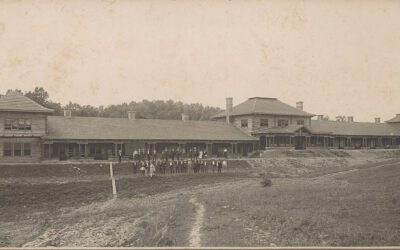It’s a Monday morning, nine o’clock, and heavy rain is causing traffic to crawl. The temperature hovers at forty degrees, the wind howls, and as I watch from inside my car, a man with a buzz cut, wearing scuffed work boots and no coat, races inside Moka Joe’s Coffee and Café in Fort Smith, Arkansas. In less than five minutes, he is back outside, sprinting for his pickup, the steam from his order making a curl above his carry-out cup.
Once inside, I find two baristas chatting amiably with customers. The sound of the rapid rainfall is startling, causing the coffee-scented air to quiver. For a moment, it’s hard to hear anything other than the sky raging. Kyle Speegle, who opened Moka Joe’s in 2010, knows what it’s like to live with intruding sounds. The only difference is that the noise he hears comes from a mechanical valve in his once-broken heart. Kyle touches his chest. “It can drive me crazy sometimes,” he says, “but as my doctor reminds me, the bigger danger would be if the sound stops.”
Kyle is smiling as he talks, peering beneath the bill of his ball cap. He wears glasses, a scruff of beard, a lime green Moka Joe’s t-shirt hiding the scar from his open-heart surgery. At forty-four years of age, he looks robust, a man in his prime, but in 2022, it was a much different story.
That summer, Kyle saw his future sprawling out in front of him, so many years left, they seemed incalculable. Married to his sweetheart, Alicia Agent, he spent his free time with her and their two young sons, Gus, who’s now seven, and Aaron, who’s three.
Not that there weren’t challenges. For one thing, Moka Joe’s opens early seven days a week, so Kyle’s never really off duty. For another, he and Alicia have ambitious careers, and they work hard to fit their busy schedules into what feels like increasingly dwindling days.
In August of 2022, Kyle needed dental surgery. Nothing earth shattering. Just a procedure to extract a wisdom tooth, which would cause Kyle to juggle schedules at work for a few days. All in all, more of a nuisance than a crisis.
Not long after, though, Kyle began having strange symptoms: acid reflux, stomach pain, night sweats, uncontrollable shivering, diminished appetite, fatigue. Alicia, who serves as the marketing manager for Baptist Health, grew concerned enough to take him to the Emergency Room in Fort Smith. Kyle was treated for a kidney infection. A trip to his regular doctor followed, and after that, when he wasn’t improving, he saw a surgeon.
In September 2022, Kyle had his gallbladder removed. The couple crossed their fingers. Certainly, he’d feel better now. But when the family celebrated Thanksgiving with Alicia’s relatives, those who didn’t regularly see Kyle pulled Alicia aside to voice their concern. “Looking back at the photos, you can see how gray and sick he looked,” Alicia says.
“During that time, I worried that I might have cancer—I was that sick. I couldn’t eat much, and I lost sixty-five pounds. Every year, I put up a big Christmas display at our house with 50,000 lights. With music. Everything. I was so weak I’d work on the lights for five minutes, then rest for thirty. But I was determined to get it done.”
On the Monday after Thanksgiving, Kyle was making dinner for his sons. Alicia was out shopping for a company event. “He called me panicked,” Alicia says. “Gus was crying in the background. Kyle’s watch told him his heart rate had shot up to 180, and all he was doing was boiling water for spaghetti at the stove.” (A normal resting heart rate is between sixty and 100 beats per minute.)
Kyle frowns. “What was hard was that I had to tell our little boy, Gus, that if I passed out, he’d need to call 911.”
Alicia raced to her car, calling her mom on the way. Her mother, who was nearby, rushed to Kyle’s side while Alicia used her frantic drive time to call a cardiologist for advice. “His heart rate had settled, and he felt better [when I got home], but I took him to the ER anyway at the advice of one of the docs.”
The doctor on duty said he wanted to “cast a wider net” because nothing around Kyle’s GI area showed any issues. With further testing, the medical staff at Baptist Health in Fort Smith found fluid around his heart. The night was long; the next morning, cardiologist Dr. A. Nasser Adjei ordered follow-up tests, and other specialists checked in. “Dr. Adjei pulled me out of the room and said he was sending Kyle to Little Rock,” Alicia says. “Kyle had a leaking heart valve and a severe infection (endocarditis) in his heart.”
How does something as simple as an infected wisdom tooth lead to symptoms like Kyle’s? It took a rare set of circumstances.
“Kyle had a special condition in his heart, called bicuspid aortic valve,” Dr. Hawamdeh, a Baptist Health cardiologist, says. “This is a genetic condition in which the main valve of the heart (aortic valve) has separated into two parts rather than the standard three parts. This condition affects one percent of the general population. The infection of heart structure from dental sources is common, especially when there is a damaged structure. Abnormal heart valves tend to go through wear and tear sooner than structurally normal valves, which probably created the perfect storm for Kyle. Had Kyle’s condition been known prior to his dental surgery, his doctors would have advocated for a dose of antibiotics, prior to having the surgery done. Kyle’s heart infection could’ve been due to the infection that required the dental surgery, or due to the infection getting to the bloodstream during the surgery.”
Today, there are more advanced tools to catch a problem like Kyle’s early in life. Experts advise immediate family members of anyone with the condition to be checked. Kyle, who grew up playing sports and was a marathon runner in his thirties, had never had reason to doubt his heart was working well.
But on that November night, Kyle’s doctors found the ticking time bomb. They ordered an ambulance to take him to Baptist Health in Little Rock, where a specialized team was ready to jump into action. Kyle doubts he understood how dire the situation was.
“Had Kyle been older or had more health problems, he probably wouldn’t have survived. Kyle’s overall good health and young age were his saving grace,” Dr. Hawamdeh says.
Once in Little Rock, things progressed quickly. At one point, Kyle’s heart rate soared again, and it took his team three attempts to bring it down. His cardiac surgeon, Dr. Karol Mudy, answered all of Kyle and Alicia’s questions. And when Kyle was wheeled into surgery, he remembers the overwhelmingly positive energy he felt.
Before that, there were tears. “You don’t think at my age that you’re going to have to talk to your wife about what happens if you don’t make it.” Kyle looks down, his eyes averted. “I tried to think of everything she needed to know. I wanted my boys to have the best life, to feel secure and loved. I couldn’t stand to think about not being there to raise them.”
When Kyle left the hospital in mid-December, he had a mechanical valve in his heart, which makes an audible ticking sound, a pacemaker in his chest, a month’s worth of antibiotics to take, and a few new prescriptions. Once at home, he noticed Gus was hesitant to leave his side. “He spends every minute he can with me,” Kyle says. “I’m scheduled for a check-up in Little Rock, and Gus asked if he could miss school to go with us.”
Kyle, who loves Moka Joe’s and used to spend way too many hours there, finally took the family on a vacation to Florida last summer. He often missed a few of Gus’ sporting events because of work, but not now. Kyle also has an even deeper admiration for Alicia. “She takes care of us,” he says, tugging the bill of his cap. He laughs. “She hands me my pills like I’m an old man.”
The good news is that Kyle will get to be an old man. Alicia, who says she’s a little bit of a nag now, making sure Kyle does what it takes to stay healthy, will be by his side. And Gus and Aaron will have grown up secure, surrounded by their parents’ love. For Kyle and Alicia, that’s the biggest gift of all.
February is American Heart Month, a time to bring attention to heart disease. While Kyle’s case was caused by genetics, The American Heart Association recommends regular checkups, not smoking, maintaining a healthy weight, controlling blood sugar and cholesterol, treating high blood pressure, and getting at least 150 minutes of exercise a week for optimal health!




